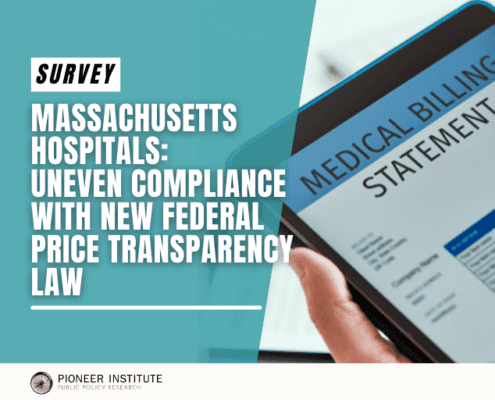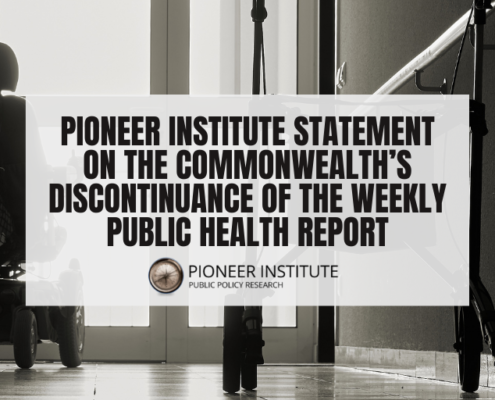Pioneer Poll: MA Healthcare Consumers Overwhelmingly Want Price Information on Services, but Few Know How to Get It
Read coverage of this poll in The Boston Globe, State House News Service, WGBH news, Bloomberg Baystate Business, and Becker’s Hospital Review, and mentions in Kaiser Health News, Commonwealth magazine, Politico and NECN.
BOSTON – Seven out of ten Massachusetts workers who get their health insurance through their employers want to know the price of a healthcare procedure before they obtain it, but most of them do not how to obtain such information, even though much price information is already available through their insurers’ cost estimator tools, according to a new poll commissioned by Pioneer Institute and conducted by DAPA Research.
Massachusetts consumers rarely seek out the price of healthcare procedures before undergoing them, but they are very interested in price and quality information and in obtaining cash back for finding lower priced providers.
The results of this poll, along with recommendations, will be released on November 4th at 1:30 pm in the Great Hall of the Massachusetts State House before a large audience of healthcare policy makers, business interests, patient advocacy groups, employers, health law attorneys, and public officials.
The event marks the fifth anniversary of the effective date of the transparency provisions of what is known in Massachusetts as Chapter 224. The event is also sponsored by the Massachusetts Treasurer and Receiver General, Deborah B. Goldberg; Consumer Affairs and Business Regulation Undersecretary, Edward Palleschi; Blue Cross Blue Shield of Massachusetts; the Massachusetts Association of Health Plans; and the Massachusetts Division of Insurance.
“One reason patients don’t seek price information is because they don’t know how to do it, and sometimes don’t even realize it’s available to them,” said Pioneer Institute Senior Fellow in Healthcare Barbara Anthony. Anthony added, “This survey shows that the public wants transparency in their healthcare prices, but easy access to such information is not yet a reality.”
Only one in five Massachusetts consumers has ever tried to find the price of a healthcare service in advance of obtaining the service. This is at least in part because more than two thirds are unaware that their insurance carriers offer a cost estimator tool.
The poll finds that:
- Seven out of ten consumers would like to know the price of a procedure before undergoing it.
- Eight in ten are interested in a website that displays out-of-pocket costs.
- More than seven in ten are interested in cashback opportunities for choosing less expensive services.
- Three quarters would like to know the price insurance companies pay providers for the healthcare services patients receive.
Other poll findings include:
- 75 percent of consumers with commercial insurance are very satisfied or satisfied with their current health insurance.
- Insurance companies and doctors are the most trusted sources of price information, with 40 percent of respondents trusting one or the other.
- Eight in ten people are interested in a website that displays doctor and hospital quality ratings.
The survey also included some counterintuitive findings, such as the fact that there was little correlation between income and decisions to obtain expensive healthcare services.
As a result of this poll, Pioneer recommends a number of actions:
- Though hospitals were not at the top of the list for people seeking price information, hospitals and doctors need to be more innovative and assertive in offering price information in consumer-friendly formats.
- Insurance companies and employers must work together to educate members and workers about the availability of pricing information to better manage healthcare costs.
- The Commonwealth should make better use of the bully pulpit and assert greater leadership in promoting price transparency and in educating businesses, consumers, insurers, and providers.
- Overall satisfaction with current health insurance means there is a significant opportunity for insurers to educate and incentivize cost consciousness among their customers.
A summary list of findings and recommendations is available online.
The poll of 500 Massachusetts residents has a margin of error of +/- 4.4 points and a 95 percent confidence level.
About Pioneer
Pioneer Institute is an independent, non-partisan, privately funded research organization that seeks to improve the quality of life in Massachusetts through civic discourse and intellectually rigorous, data-driven public policy solutions based on free market principles, individual liberty and responsibility, and the ideal of effective, limited and accountable government.
###
State Officials and Health Insurance Companies Praise Price Transparency Efforts
“It is critically important that Massachusetts residents receive transparent and accurate pricing information. I applaud these consumer protection efforts that have empowered people to make more informed financial choices when making decisions regarding their healthcare,” said Deborah B. Goldberg, Massachusetts Treasurer and Receiver General
“MAHP and our member plans are committed to promoting the value of cost transparency for Massachusetts consumers. When consumers are able to access cost and quality information, they are able to make more informed healthcare choices. Health plan cost estimate websites are important tools for consumers to help them understand the true cost of their care,” said Lora Pellegrini, Esq., President and CEO of the Massachusetts Association of Health Plans
“Blue Cross Blue Shield of Massachusetts is committed to making sure our members have the tools they need to find high-quality, affordable care. While we’ve made significant progress, such as investing in our Find a Doctor and Estimate Costs tools, we know there is more to be done. We look forward to collaborating with the health care community as we look for ways to enhance transparency efforts.” Statement issued by Blue Cross Blue Shield of Massachusetts
“For consumers to be empowered they must be informed, which is why transparency in health care costs is essential. Having this information helps consumers make better decisions because it allows them to weigh multiple factors when they decide which medical specialist or facility to visit,” said Edward A. Palleschi, Undersecretary for the Massachusetts Office of Consumer Affairs and Business Regulation
“Significant progress has been made in improving the state healthcare delivery system but more can be done to ensure that Massachusetts residents know about and use available tools to make informed healthcare choices. Transparency in healthcare costs and knowing how to use this information allows Massachusetts residents to feel confident in their healthcare decisions,” said Gary Anderson, Massachusetts Commissioner for the Division of Insurance
Get Updates On Our Healthcare Cost Transparency Initiative!
Related Posts








